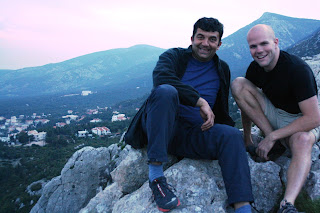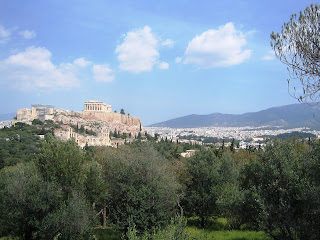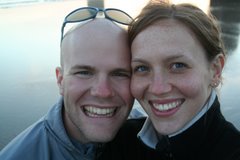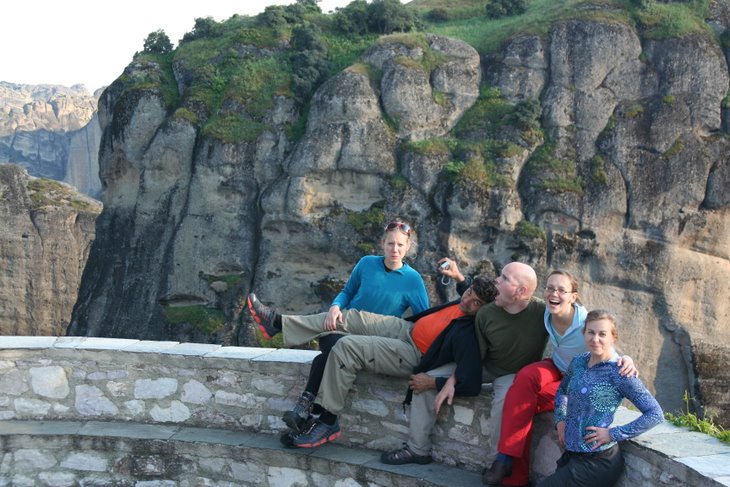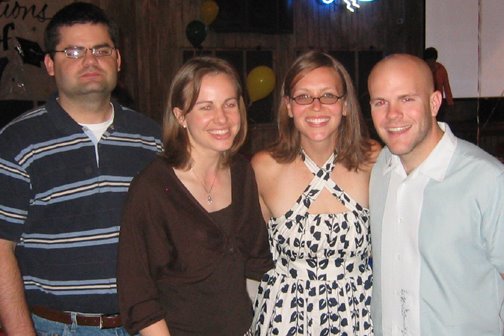As for the overall survey, our plan involved an attempted survey of 20-30% of Nea Zoi's contacts in sex work in Athens, approximately 40-50 surveys in total. As this week continued, we pushed past 30, then 37, then 42 and finally an N of 47 as Lindsay and I finished our last outreaches this Thursday. Nea Zoi may continue pursuing the surveying as they need, but with our goal N achieved, we set about analyzing the data and framing future plans based on what we'd learned. The survey design, translation and data analysis were somewhat my project, and Lindsay paralleled that effort with a four-phase plan that we created to move the medical pilot project in a manageable step-wise progression. Our first draft involved an end goal of an on-site medical clinic at Nea Zoi's office, but as we continued the survey, the more valuable effort seemed to be a medical buddy service and mobile clinic to the neighborhoods Nea Zoi visits. Lindsay continued shaping the plan as we worked and learned more through our visits with Dr. Koutras and conversations with the women.
 Ultimately, when I completed the data collection with the 47 surveys, we had a fairly complete picture of the health of the women (and several transvestites, although not as complete of a sample for them). We met with Nea Zoi staff on Monday to informally present our findings and discuss what everyone had learned. The meeting was actually quite touching for Lindsay and me, seeing the tangible results of our work (we think they were a bit shocked by our productivity and medical-student work ethic, much to our amusement), and the impact the pilot medical project had on Nea Zoi itself. As you can probably imagine from my discussions in previous posts, the work this group does is not all clear-cut direction and happy endings. Often it's quite the opposite, and we realized over these two weeks that we had joined their team during a dry spell of far more discouragement than encouragement. Madames turning them away bluntly or blustering loudly in shouted curses, new women slipping under the radar, old women wanting to stay in prostitution to make money for themselves, brothels assuming they were reporting information to the police ... the list goes on. We were told over and over that our presence was invigorating and motivating, a breath of fresh air into a stagnant situation. As the surveys became a positive step in their interactions with the women and created enthusiastic, grateful feedback, the Nea Zoi team got the encouragement they needed. And the vision coming out of our work is a very exciting framework for moving their work forward in a way that left our Monday staff meeting fairly impassioned.
Ultimately, when I completed the data collection with the 47 surveys, we had a fairly complete picture of the health of the women (and several transvestites, although not as complete of a sample for them). We met with Nea Zoi staff on Monday to informally present our findings and discuss what everyone had learned. The meeting was actually quite touching for Lindsay and me, seeing the tangible results of our work (we think they were a bit shocked by our productivity and medical-student work ethic, much to our amusement), and the impact the pilot medical project had on Nea Zoi itself. As you can probably imagine from my discussions in previous posts, the work this group does is not all clear-cut direction and happy endings. Often it's quite the opposite, and we realized over these two weeks that we had joined their team during a dry spell of far more discouragement than encouragement. Madames turning them away bluntly or blustering loudly in shouted curses, new women slipping under the radar, old women wanting to stay in prostitution to make money for themselves, brothels assuming they were reporting information to the police ... the list goes on. We were told over and over that our presence was invigorating and motivating, a breath of fresh air into a stagnant situation. As the surveys became a positive step in their interactions with the women and created enthusiastic, grateful feedback, the Nea Zoi team got the encouragement they needed. And the vision coming out of our work is a very exciting framework for moving their work forward in a way that left our Monday staff meeting fairly impassioned.The survey showed several widespread needs - emotional and practical support through the process of receiving care through the Greek national health care system, which can be complicated; providing care for the women who don't have legal status in Greece or access to the national medical system; making consistent psychological care available to the women. We also tracked prevalence of specific symptoms and health access, and gave the women an outlet to contribute their ideas for improving their medical situations - some of the possibilities were quite creative!

With that broad picture and the full spread of other details, Lindsay created a basic plan for the continuing medical project as follows:
Phase One - medical survey to assess needs of target population and effective supplemental medical care; detail results to target goals of the proposed project
Phase Two – host 2 pilot clinic sessions on 4/20, 4/27 to determine need for local clinical services; educational socials hosted at Nea Zoi office and 5 minute educational conversations on the street; educate volunteers in medical topics; incorporation of psychotherapy, medical appointments, referrals with network of trusted local physicians who understand the needs of the population, make vaccinations available (Hep B, Hep A, HPV as appropriate).
Phase Three – provide “outreach medical care” - team will serve as facilitators to medical diagnosis and treatment, providing transportation, paying for laboratory or radiology testing, paying for treatment, providing psychotherapy. Provide social support going to the doctor with the men/women or helping facilitate their care, such as setting up appointments and facilitating follow-up care.
Phase Four – provide mobile clinic to neighborhoods of Omonia, Filis and others as needed; staff with volunteer physicians and nurses within referral network associated with Nea Zoi
The grant proposal is on its way to completion to provide funding for social work staffing and medical supplies, vaccinations, funds to supplement medical care etc. The whole project shows incredible promise to not only address the medical needs of the women and men, but to continue bridging the trust gap and preparing them for the psychological process of moving out of prostitution and addressing trafficking. We'll see what develops with the medical project from the continuing efforts of Nea Zoi, but all in all, we're grateful for a lot of answered prayers and a promising outlook for our time in Athens! It's refreshing to offer a small, targeted solution to part of a broader global problem, and to happily contribute our meager talents to a worthy and tangible fight.






